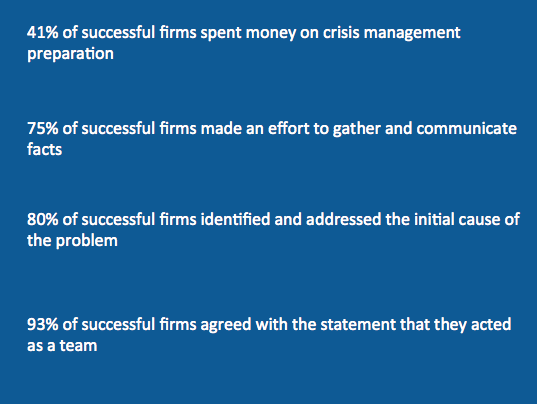With the abrupt disruption to normal business operations that COVID-19 has caused it can be easy to use the pandemic as a scapegoat for struggling company growth and revenue. Now, with riots and looting running rampant throughout major cities it’s even easier to chalk 2nd and 3rd quarter 2020 as a definite loss… but could these downturns have been turned into opportunity?
Hindsight is 20/20. An average business would see a crisis and believe it is a negative, whereas the elite businesses look to take advantage of every type of situation. History has shown us that the disruption to business operations is frequent and with the increasing complexities in the world of business, the likelihood of a crisis occurring has also grown. So, how can a business that is facing a potential crisis situation flip the script and turn the threat into an opportunity?
Price Waterhouse Cooper (PwC) conducted a survey with over 2,000 companies about their worst crises and analyzed their findings on over 4,500 total crises that businesses faced. Of the participants, 42% responded that they were in a “better place” due to their response and handling of the crisis at hand; with some businesses even seeing revenue growth through the troubling times. Here’s how they managed to achieve that:

1. Allocate a Budget Towards Crisis Management
41% of the firms who were in a better place spent money on crisis management before anything even occurred. Similarly, an almost-identical 39% saw revenue growth: a testament to the reward of being proactive.
2. Have a Plan
In the heat of the moment there is an urgency to address a crisis so it can be resolved as fast as possible. Without a plan, company leaders often take steps towards alleviating the crisis that actually exacerbate it. Having a practiced plan will help avoid any premature or inappropriate reactions to the crisis itself, the media, or stakeholders. Firms that had a crisis response plan were twice as likely to fare better post-crisis than those who did not have a plan.
3. Adapt a Fact-Based Approach
Finding and stating the facts is a key component in handling any crisis. 75% of the firms who found success post-crisis prioritized transparency and allocated resources towards compiling and addressing the facts of the situation. Stakeholders value transparency and having a commitment to presenting them with the truth of the matter shows a company’s integrity and humility, which could lead to public support during hard times.
4. Root-Cause Analysis
Learning from the past is the key to growth. As Henry Ford said, “The only real mistake is the one from which we learn nothing.” 80% of the companies who were in a better place post-crisis returned to the root of the problem and performed an analysis to identify and mitigate the risks that led to the crisis. They then used that information to forecast more potential liabilities that could help prevent future crises.
5. Act as a Team
93% of companies that emerged in a better place after a crisis agreed that they acted as a team during the crisis. Overcoming the adversity from a crisis can be an experience that leads to stronger bonds within an organization and an enhanced internal culture throughout the firm. In times of hardship, it is important to have strong leadership and effective communication to ensure every team member is pulling the rope in the same direction.
With a crisis looming it can be easy to see it only as a threat to normal business operations, but with the right mindset and strategy, a crisis can be turned into a great opportunity to grow as a business. However, it is important to remember as a business that you don’t have to fight alone. 74% of survey participants sought third-party help in order to prepare and manage a crisis. Having handled numerous crises themselves, the Evans Brothers Consulting Team is the perfect partner to have throughout the crisis management process.
